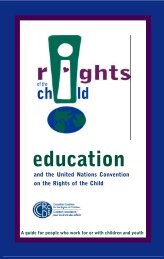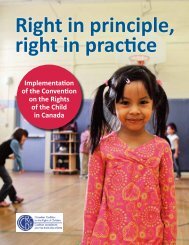Poste - Canadian Coalition for the Rights of Children
Poste - Canadian Coalition for the Rights of Children
Poste - Canadian Coalition for the Rights of Children
You also want an ePaper? Increase the reach of your titles
YUMPU automatically turns print PDFs into web optimized ePapers that Google loves.
C A N A D I A N C O A L I T I O N F O R T H E R I G H T S O F C H I L D R E N<br />
wearing <strong>of</strong> a student uni<strong>for</strong>m does not result in any<br />
violation <strong>of</strong> freedom <strong>of</strong> expression <strong>for</strong> “to do so would<br />
trivialize <strong>the</strong> Charter.” 49<br />
In Peel Board <strong>of</strong> Education v. Ontario (Human <strong>Rights</strong><br />
Commission) (1991), 50 it was decided that a Sikh student<br />
had <strong>the</strong> right to wear his kirpan (a ceremonial dagger<br />
carried by religious Sikhs) to school. However, certain<br />
safety restrictions, such as <strong>the</strong> size <strong>of</strong> <strong>the</strong> kirpan, had to<br />
be followed. This ruling was based on <strong>the</strong> principles <strong>of</strong><br />
freedom <strong>of</strong> religion, not expression.<br />
In Zylberberg v. Sudbury Board <strong>of</strong> Education(1988), 51<br />
<strong>the</strong> majority decision <strong>of</strong> <strong>the</strong> Ontario Court <strong>of</strong> Appeal<br />
declared regulations <strong>for</strong>cing recitation <strong>of</strong> <strong>the</strong> Lord’s<br />
Prayer and <strong>the</strong> reading <strong>of</strong> <strong>the</strong> scriptures from <strong>the</strong><br />
Christian Bible did violate <strong>the</strong> Charter freedoms.<br />
Exempting a student who did not wish to participate was<br />
not sufficient <strong>for</strong> it would compel “students and parents<br />
to make a religious statement.”<br />
Two years later, <strong>the</strong> same court decided, in <strong>Canadian</strong><br />
Civil Liberties Association v. Ontario, 52 to strike down<br />
regulations allowing indoctrination <strong>of</strong> pupils into <strong>the</strong><br />
Christian faith. It was held that section 2(a) <strong>of</strong> <strong>the</strong><br />
Charter prohibits religious indoctrination, but that it does<br />
not prohibit education about religion.<br />
In 1986, a 12-year-old Ontario girl was denied <strong>the</strong> right<br />
to play hockey on a boy’s team, an action which was<br />
upheld by <strong>the</strong> Ontario Human <strong>Rights</strong> Commission by<br />
reason <strong>of</strong> section 19(2) <strong>of</strong> <strong>the</strong> Human <strong>Rights</strong> Code, which<br />
allows athletic organizations to restrict <strong>the</strong>ir members to<br />
persons <strong>of</strong> <strong>the</strong> same sex. In Re Blainey and Ontario<br />
Hockey Association et al, 53 <strong>the</strong> Ontario Court <strong>of</strong> Appeal<br />
found that section 19(2) <strong>of</strong> <strong>the</strong> Ontario Human <strong>Rights</strong><br />
Code was inconsistent with section 15(1) <strong>of</strong> <strong>the</strong> Charter<br />
because it permitted discrimination in an athletic activity<br />
on <strong>the</strong> basis <strong>of</strong> sex but prohibited discrimination on o<strong>the</strong>r<br />
grounds such as race, colour and ethnic origin. However,<br />
<strong>the</strong> Court did not direct <strong>the</strong> hockey association to extend<br />
its membership because <strong>the</strong> hockey association was not<br />
exercising a governmental function and <strong>the</strong> Charter does<br />
not extend to private activity.<br />
In Chamberlain et al versus Surrey School Board, 54 <strong>the</strong><br />
Surrey School Board said that resources by gay and<br />
lesbian groups were not approved <strong>for</strong> use in <strong>the</strong> school<br />
district, including three books depicting children with<br />
same-sex parents <strong>for</strong> use in kindergarten and Grade 1.<br />
The British Columbia Supreme Court concluded that <strong>the</strong><br />
Surrey board’s books resolution is contrary to <strong>the</strong> School<br />
34<br />
Act and beyond its authority. The Court said that <strong>the</strong><br />
second resolution was “significantly influenced by<br />
religious consideration” and that this was contrary to <strong>the</strong><br />
School Act provisions requiring schools to be conducted<br />
on strictly secular principles.<br />
Human <strong>Rights</strong> Commissions<br />
Each province or territory has a human rights commission<br />
or similar body that has jurisdiction over its respective<br />
human rights legislation. Most commission activities<br />
revolve around <strong>the</strong> investigation and conciliation <strong>of</strong><br />
complaints about discriminatory practices within <strong>the</strong> public<br />
and private sectors. 55 Although age is a prohibited ground<br />
in certain provinces and territories, only people between 18<br />
and 65 years <strong>of</strong> age are protected from age discrimination.<br />
In British Columbia and Saskatchewan, however, <strong>the</strong><br />
human rights commissions have petitioned <strong>the</strong> provincial<br />
governments to change <strong>the</strong> legislation to <strong>of</strong>fer protection<br />
against age discrimination to those under 19 years <strong>of</strong> age.<br />
The British Columbia Human <strong>Rights</strong> Commission’s<br />
mandate does not include services to children. The Nova<br />
Scotia Human <strong>Rights</strong> Commission does not accept<br />
complaints from children under <strong>the</strong> age <strong>of</strong> 18 without<br />
consent from a parent or guardian and it estimates that<br />
fewer than 12 have been received since 1991. 56 While o<strong>the</strong>r<br />
commissions allow children to file <strong>the</strong>ir own complaints,<br />
most report that children’s complaints are usually filed on<br />
<strong>the</strong>ir behalf by <strong>the</strong>ir parents. Typical complaints include<br />
harassment in a school setting; refusal to permit a child to<br />
participate in certain sports activities; and stores that try to<br />
limit <strong>the</strong> number <strong>of</strong> children allowed inside at one time.<br />
Ombudsmen<br />
Generally, an ombudsman is an independent person<br />
appointed to receive, investigate and resolve complaints<br />
about <strong>the</strong> administration <strong>of</strong> public services. She or he is an<br />
impartial investigator with <strong>the</strong> power to discover <strong>the</strong> facts<br />
<strong>of</strong> a case and to determine an appropriate resolution. 57 The<br />
ombudsman does not advise <strong>the</strong> minister and does not<br />
represent a department or a complainant at <strong>the</strong> outset <strong>of</strong> an<br />
investigation. 58<br />
All provinces and territories, except Newfoundland, Prince<br />
Edward Island and <strong>the</strong> Northwest Territories, have an<br />
ombudsman. There is no national ombudsman <strong>for</strong> federal<br />
matters.<br />
The Nova Scotia Ombudsman’s Office reports that<br />
children in care have brought <strong>for</strong>ward concerns about <strong>the</strong>ir<br />
fundamental freedoms. The concerns were investigated and




